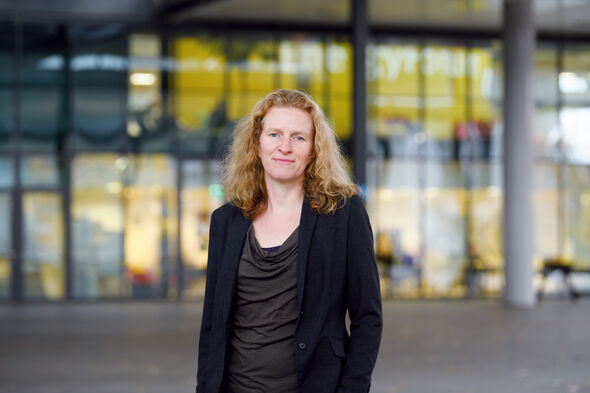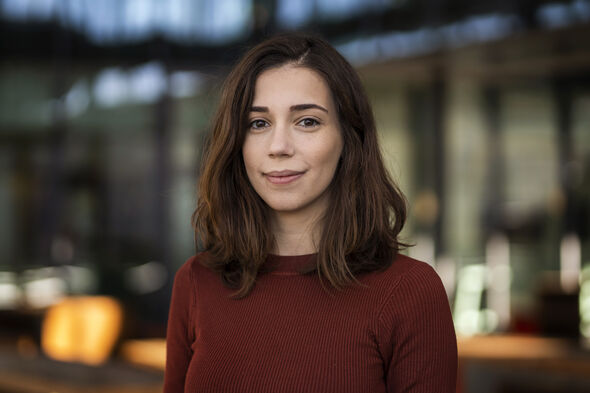
Where climate science meets politics: TU/e experts at IPCC
Eindhoven scientists contribute to the next United Nations climate report
The UN organization IPCC lays the scientific foundation for global climate policy in its periodic reports. A new report cycle is due, and TU/e researchers Clara Caiafa, Pieter Pauw, and Arghavan Akbarieh are among its contributors. But to what extent can they influence future climate legislation? Cursor asked TU/e professor and IPCC veteran Heleen de Coninck.
Gaza, Ukraine, refugees—right now, everything seems to overshadow climate change. But the climate pays little attention to political agendas, which is why the IPCC continues to work relentlessly. The IPCC, or Intergovernmental Panel on Climate Change, is part of the United Nations. It periodically assesses the state of climate research in reports that serve as a scientific foundation for policymakers and climate negotiators worldwide.
These Assessment Reports appear roughly every six to seven years. Work on the seventh report is about to begin. That’s when the tasks of Clara Caiafa and Pieter Pauw—both from the Department of Industrial Engineering & Innovation Sciences (IE&IS) and both lead authors of a chapter—will start. Arghavan Akbarieh, from the Department of the Built Environment (BE), will later take up her role as review editor, ensuring that reviewers’ comments on draft versions are properly addressed.
But how much influence can Caiafa and Pauw’s work actually have on climate policy? Can researchers, basing their conclusions on peer-reviewed literature, really stand up to populism, fossil fuel interests, and public skepticism? Cursor asked Heleen de Coninck, professor of Socio-Technical Innovation and Climate Change (IE&IS).
De Coninck has been involved in IPCC reports since 2005, taking on increasingly responsible roles. She was one of the coordinating lead authors of the 2018 Special Report commissioned by the parties to the Paris Agreement. That report had major impact because it revealed the severe consequences of exceeding 1.5 degrees Celsius of global warming.
De Coninck is not involved in the upcoming Seventh Assessment Report, which Caiafa and Pauw are helping to write. “It overlaps with my current work on another IPCC Special Report—this one about cities and climate change—so I didn’t put myself forward for nomination by the Dutch delegation.”
How do IPCC authors work?
De Coninck: “An Assessment Report involves around seven hundred authors divided among three working groups. The first working group looks at the physical science basis: how does climate change work? The second examines the impacts of climate change and how we can adapt to them. Pieter Pauw is part of that group; his chapter focuses on financing adaptation. The third group studies mitigation—how to reduce CO₂ emissions. That’s my field, and also that of Clara Caiafa.”
“The authors gather as many relevant scientific publications as possible. It’s a huge undertaking because climate research has exploded in recent years. Last time, we reviewed all sources without help of AI tools, but I doubt that’s still feasible now.”
The text is only finalized once all UN member states have reached consensus on every single word and figure
“Once a draft text is ready, it goes to hundreds of reviewers, who provide thousands of comments. The authors then revise the text accordingly, while review editors like Arghavan Akbarieh check that this process is fair. Addressing all the reviews takes enormous time, but it’s crucial, precisely because so much research is being done. If we’ve missed important sources or interpretations, reviewers will point that out.”
“Creating an Assessment Report takes about two and a half years. The work comes in spurts, with some quiet periods in between. But during those peaks, it often spills into evenings and weekends. Authors aren’t paid, so they fit it in alongside their regular work.”
How does the report get the UN’s official seal of approval?
“The IPCC forms the bridge between climate science and politics. Its structure is cleverly designed, in my view. As part of the UN, the IPCC is governed by all member countries—from the US to the Netherlands, and from Saudi Arabia to small island states like Vanuatu. All countries jointly agree, by consensus, to commission a report. When the draft is ready, member states generally can’t alter the scientific content, except by submitting review comments.”
“The authors process those comments and then write a Summary for Policymakers (SPM). This SPM is quite special: the text is only finalized once all UN member states have reached consensus on every single word and figure. That approval carries great significance—all countries formally endorse this precise reflection of the current state of climate science.”
“The negotiations over the SPM take place during a week-long plenary session that often continues day and night toward the end. I’ve been through it five times now, and it’s a fascinating process. Science and politics collide—and yes, it can get tense. Understandably so: for island states threatened by rising seas, it’s literally a matter of survival to have that evidence included in the SPM. Meanwhile, oil-producing nations push hard in the opposite direction, since their futures are at stake too.”
IPCC reports played a major role in winning the Urgenda lawsuit and in Milieudefensie’s case against Shell
“In this verbal crossfire, the authors act as gatekeepers of science. It’s their job to say, ‘The wording you’re negotiating now no longer aligns with the underlying report.’”
How influential are the IPCC reports?
“When a new Assessment Report is released, it makes front-page news worldwide, because every country has accepted its contents. As authors, we must write in a way that is ‘policy-relevant but not policy-prescriptive,’ meaning we don’t tell governments what to do with the findings. Still, these reports clearly influence policy. For instance, the European Climate Law was based on the earlier Special Report on 1.5 degrees of warming.”
“The reports also empower citizens and environmental organizations to hold their governments accountable: ‘You’ve accepted this scientific consensus, so you can’t just ignore or deny it now.’ IPCC reports played a major role, for example, in winning the Urgenda lawsuit and in Milieudefensie’s case against Shell.”
And where does their influence stop?
“What we as researchers can’t counter is outright denial of science. Facts that have been established by decades of consensus are now being denied, even in the Dutch House of Representatives.
Thankfully, that doesn’t reflect public opinion: according to a recent study, 86 percent of people worldwide are concerned about climate change. The vast majority believes the climate is changing and that humanity is at least partly responsible. So there’s plenty of public support for climate action. That’s in the scientific literature—and that’s exactly what the IPCC can report.”
Clara Caiafa: “Fear of change is as understandable as it is counterproductive”
Clara Caiafa is one of the lead authors of the upcoming IPCC report. She is contributing to the chapter on industrial mitigation—reducing CO₂ emissions from industry. “My expertise lies in the socioeconomic and policy aspects of that process,” she explains. In her daily work, she is a postdoctoral researcher with the Technology, Innovation & Society group (IE&IS).
Caiafa is already familiar with how the IPCC operates: “For the previous assessment report, I worked as a chapter scientist, performing supporting tasks such as checking literature references.” She also contributed as a writer back then, but not as a lead author. The difference is that lead authors are nominated by UN member states. They are also responsible for writing and coordinating a specific section of a chapter.
Voting booth
Caiafa is originally from Brazil, and that background—combined with her studies in economics and international relations—shapes her perspective on climate policy. “What matters most is public support for the transition, both from politicians and from citizens,” she says. “Technological innovations alone won’t get us there.”
In developing countries and emerging economies like Brazil, climate rarely determines how people vote, she notes. Compared to issues such as poverty, climate change can seem distant and abstract—but is it really?
“In fact, these are often the very countries that will face the most severe consequences of climate change—such as droughts, floods, and heat waves—while lacking the knowledge and resources to adapt themselves.”
Meanwhile, wealthier nations—those with the privilege to focus on climate—tend to fear that sustainability efforts will harm their economies, Caiafa continues. She believes that this fear of change is as understandable as it is counterproductive.
Key
In her view, the key lies in communication. “We need to do a better job of conveying how profoundly climate change will affect everyday life—and also what opportunities the sustainable transition offers, including in socioeconomic terms.”
“Change is inevitable anyway. Either through our own actions or through climate change – which will also damage economies. The best thing to do is to take active control ourselves.”
This article was translated using AI-assisted tools and reviewed by an editor.



Discussion